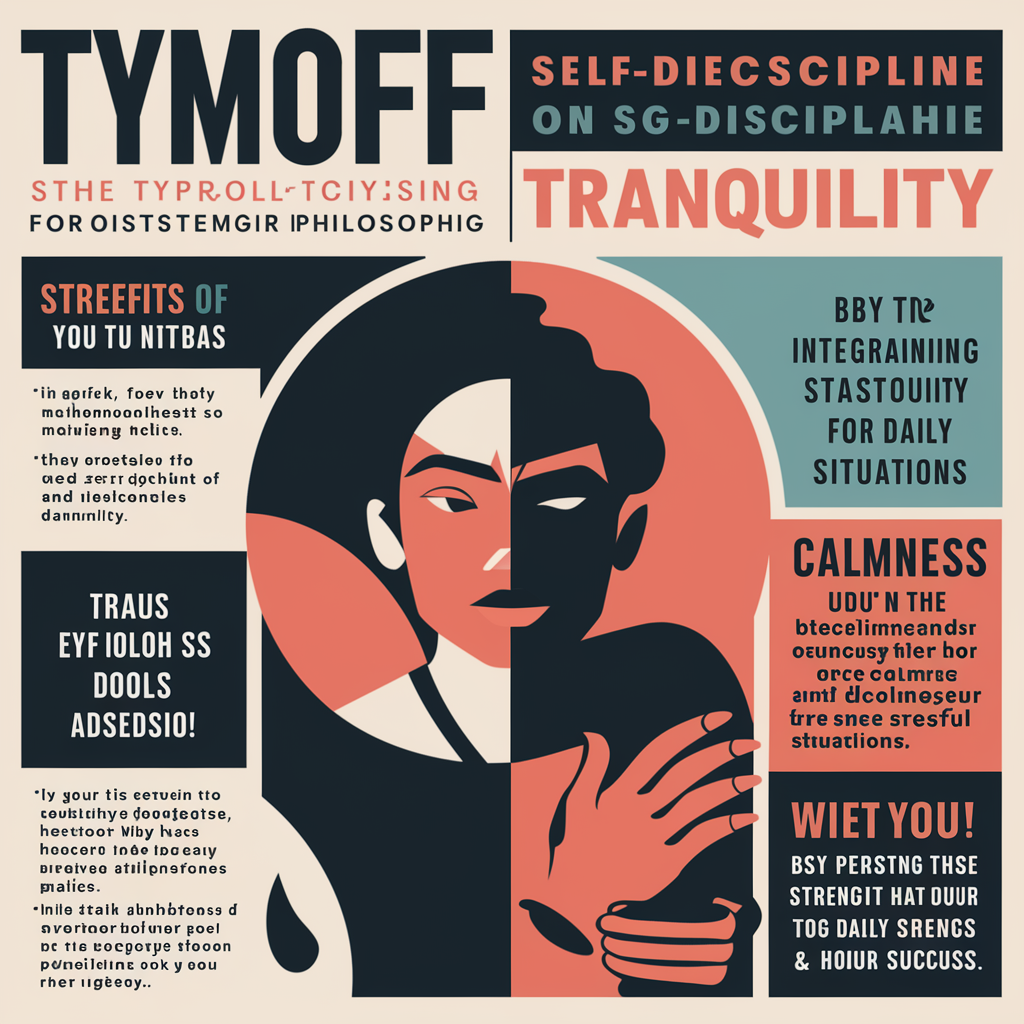Master the art of self-discipline and tranquility with Tymoff’s philosophy: self-control is strength. calmness is mastery. – Tymoff. Unlock your potential by integrating these essential qualities into your daily life for personal strength and resilience.
In our fast-paced world, mastering self-control and achieving a state of calmness can feel like superpowers. These qualities aren’t just for the naturally zen or exceptionally disciplined; they are skills anyone can develop. Tymoff, a leader in personal development, believes that by harnessing these abilities, you can unlock personal strength and transform your life.
- Self-control helps you make better decisions.
- Calmness keeps you grounded during stress.
- Personal strength through these traits leads to success.
By the end of this article, you’ll have practical tips to cultivate these essential qualities.
Understanding Self-Control
What is Self-Control?
Self-control is the ability to regulate your emotions, thoughts, and behaviors in the face of temptations and impulses. It’s what helps you stay focused on your goals and avoid distractions. Whether it’s resisting that tempting piece of cake when you’re on a diet or staying calm during a heated argument, self-control is a crucial skill.
Self-control plays a significant role in both personal and professional life. It helps you stay committed to your long-term goals, maintain discipline, and make rational decisions even under pressure. Without self-control, you might find yourself easily swayed by immediate gratifications, which can hinder your progress.
Benefits of Self-Control

Developing self-control comes with numerous benefits:
- Improved Decision-Making: With better self-control, you’re able to think before you act. This means making choices that align with your long-term goals rather than succumbing to short-term temptations.
- Better Stress Management: Self-control helps you stay composed in stressful situations. Instead of reacting impulsively, you can assess the situation calmly and respond thoughtfully.
- Enhanced Productivity: When you can control your impulses, you’re more likely to stay focused on tasks, leading to higher productivity. You can prioritize your work and avoid distractions, ensuring you meet your deadlines and goals.
Techniques to Develop Self-Control
Building self-control is like developing a muscle; the more you practice, the stronger it becomes. Here are some effective techniques:
- Mindfulness Techniques: Mindfulness helps you stay present and aware of your thoughts and feelings. Practices like meditation and deep breathing can enhance your self-control by keeping you grounded.
- Setting Clear Goals: Having specific, measurable, achievable, relevant, and time-bound (SMART) goals can guide your actions and help you stay focused. Clear goals provide direction and reduce the temptation to stray.
- Practicing Delayed Gratification: Train yourself to delay immediate rewards in favor of long-term benefits. For example, if you’re trying to save money, resist the urge to make impulse purchases and save for a bigger, more meaningful reward.
The Power of Calmness
What is Calmness?
Calmness is the ability to remain serene and composed, especially in stressful or challenging situations. It’s not about suppressing your emotions but managing them in a way that keeps you grounded and rational.
Calmness is often misunderstood as passivity or indifference. However, it’s a powerful state of mind that enables you to navigate life’s ups and downs with grace and clarity. It helps you respond rather than react, making thoughtful decisions instead of impulsive ones.
Benefits of Staying Calm

The benefits of maintaining calmness are profound:
- Better Emotional Regulation: Staying calm allows you to manage your emotions effectively. You can process your feelings without being overwhelmed, leading to better mental health.
- Improved Relationships: Calmness helps in building and maintaining healthy relationships. When you’re calm, you’re more likely to communicate effectively and resolve conflicts amicably.
- Enhanced Mental Wellness: A calm mind is less likely to be troubled by anxiety and stress. It fosters a sense of peace and well-being, contributing to overall mental wellness.
Strategies to Cultivate Calmness
Cultivating calmness requires practice and dedication. Here are some strategies to help you stay calm:
- Breathing Exercises: Simple breathing techniques can instantly calm your mind and body. Practice deep breathing, where you inhale slowly through your nose, hold for a few seconds, and exhale slowly through your mouth.
- Meditation and Mindfulness Practices: Regular meditation can train your mind to stay calm and focused. Mindfulness practices, like being fully present in the moment, can also reduce stress and enhance calmness.
- Creating a Calming Environment: Your surroundings can significantly impact your state of mind. Create a peaceful environment at home and work by decluttering, adding soothing elements like plants, and playing calming music.
Emotional Mastery and Personal Strength
What is Emotional Mastery?
Emotional mastery is the ability to understand and manage your emotions effectively. It involves being aware of your feelings, recognizing their impact on your thoughts and actions, and controlling them in a way that promotes personal growth and positive interactions.
Emotional mastery is crucial for personal and professional success. It helps you navigate complex emotions, build strong relationships, and make informed decisions. By mastering your emotions, you can achieve greater self-awareness and resilience.
Link Between Emotional Mastery and Personal Strength

Mastering your emotions leads to greater personal strength. When you can control your emotional responses, you’re less likely to be swayed by external pressures. This inner strength allows you to stay true to your values and goals, even in challenging situations.
- Greater Resilience: Emotional mastery builds resilience by helping you bounce back from setbacks. You learn to manage your emotions during tough times, which strengthens your ability to cope and thrive.
- Improved Decision-Making: With emotional mastery, you can make decisions based on logic and reason rather than emotional impulses. This leads to better outcomes and more consistent progress toward your goals.
- Enhanced Relationships: Managing your emotions effectively improves your interactions with others. You become a better communicator, more empathetic, and capable of resolving conflicts constructively.
Developing Emotional Intelligence
Emotional intelligence (EI) is a key component of emotional mastery. It involves recognizing, understanding, and managing your own emotions and those of others. Here are some techniques to enhance your EI:
- Self-Awareness: Pay attention to your emotions and what triggers them. Journaling and reflection can help you understand your emotional patterns and how they influence your behavior.
- Empathy and Social Skills: Practice empathy by actively listening to others and trying to understand their perspectives. Developing strong social skills, such as effective communication and conflict resolution, can also enhance your EI.
- Self-Regulation: Learn to control your emotional responses. Techniques like deep breathing, mindfulness, and positive self-talk can help you stay calm and focused in emotionally charged situations.
Tymoff’s Philosophy on Self-Control and Calmness
Introduction to Tymoff
Tymoff is a renowned expert in personal development and emotional mastery. With years of experience and a deep understanding of human behavior, Tymoff has helped countless individuals achieve greater self-control and calmness.
- Background and Expertise: Tymoff’s philosophy is rooted in a blend of psychology, mindfulness, and practical strategies. By integrating these elements, Tymoff provides a holistic approach to personal growth.
- Core Principles: The core principles of Tymoff’s philosophy revolve around self-awareness, emotional regulation, and continuous improvement. Tymoff believes that anyone can develop these skills with the right guidance and practice.
Key Teachings

Tymoff’s teachings emphasize the integration of self-control and calmness into daily life. By following these principles, you can achieve a balanced and fulfilling life.
- Integrating Self-Control and Calmness: Tymoff teaches practical techniques to develop self-control and calmness. These include mindfulness practices, goal-setting, and stress management strategies.
- Achieving Balance and Harmony: According to Tymoff, balance and harmony are achieved by aligning your actions with your values and goals. This involves making conscious choices that promote well-being and personal growth.
- Practical Applications: Tymoff provides real-life examples and success stories to illustrate the effectiveness of these techniques. By applying these principles, you can overcome challenges and achieve your full potential.
Practical Applications
Tymoff’s techniques are designed to be easily integrated into everyday life. Here are some practical applications:
- Mindfulness Practices: Incorporate mindfulness into your daily routine. This can be as simple as taking a few minutes each day to meditate or practice deep breathing.
- Goal-Setting: Set clear, achievable goals that align with your values and aspirations. Regularly review and adjust your goals to stay on track.
- Stress Management: Use stress management techniques, such as exercise, relaxation exercises, and time management, to maintain a sense of calm and control.
Practical Tips for Everyday Implementation
Daily Habits for Self-Control
Building self-control requires consistent effort and practice. Here are some daily habits to help you develop this essential skill:
- Creating Routines and Rituals: Establishing routines can help you stay focused and disciplined. Create a morning routine that sets a positive tone for the day, and develop evening rituals that promote relaxation and reflection.
- Practicing Mindful Decision-Making: Make a conscious effort to think before you act. Before making a decision, pause and consider how it aligns with your long-term goals and values.
- Avoiding Temptations: Identify your triggers and create strategies to avoid them. For example, if you’re trying to eat healthier, keep unhealthy snacks out of sight and stock up on nutritious options.
Maintaining Calmness in Stressful Situations

Staying calm during stressful situations is crucial for maintaining your overall well-being. Here are some tips to help you stay calm:
- Quick Relaxation Techniques: Use quick relaxation techniques, like deep breathing or visualization, to calm your mind and body. These techniques can help you stay composed in the face of stress.
- Positive Self-Talk and Affirmations: Replace negative thoughts with positive affirmations. Remind yourself of your strengths and capabilities to stay confident and calm.
- Prioritizing Tasks: Prioritize your tasks and focus on completing them one at a time, rather than multitasking. This can help you manage your workload more effectively and reduce stress.
Building Long-Term Resilience
Resilience is the ability to bounce back from setbacks and keep moving forward. Here are some strategies to build long-term resilience:
- Setting and Achieving Personal Goals: Set personal goals that challenge you and push you out of your comfort zone. Achieving these goals will boost your confidence and resilience.
- Continuous Learning and Self-Improvement: Commit to continuous learning and self-improvement. Read books, attend workshops, and seek feedback to keep growing and evolving.
- Developing a Support System: Build a strong support system of friends, family, and mentors who can provide encouragement and guidance during tough times.
FAQs
What does “self-control is strength. calmness is mastery.Tymoff” mean?
This phrase means that having self-control gives you the strength to make better choices, and being calm helps you master your emotions. According to Tymoff, combining these qualities can lead to a stronger, more balanced life.
How can I develop self-control?
You can develop self-control by setting clear goals, practicing mindfulness, and learning to delay gratification. Start small, like resisting a treat, and gradually work on bigger challenges to strengthen your self-discipline.
What are some tips to stay calm in stressful situations?
To stay calm during stress, try deep breathing, positive self-talk, and taking breaks. Creating a peaceful environment and practicing mindfulness can also help you stay grounded and relaxed.
How does calmness contribute to personal strength?
Calmness helps you think clearly and make better decisions, which contributes to personal strength. When you’re calm, you can handle challenges more effectively and maintain better relationships.
Why is it important to combine self-control and calmness?
Combining self-control and calmness helps you manage your emotions and actions more effectively. This balance leads to better decision-making, improved relationships, and greater resilience in facing life’s challenges.
Conclusion
Mastering self-control and calmness can transform your life, helping you achieve personal strength and resilience. By following Tymoff’s philosophy and integrating practical techniques into your daily routine, you can cultivate these essential qualities.
- Recap: Self-control helps you make better decisions, while calmness keeps you grounded. Together, they lead to personal strength and success.
- Encouragement: Apply the techniques and philosophies discussed in this article to improve your self-control and calmness.
- Final Note: Achieving personal mastery is a journey, but with dedication and practice, you can unlock your full potential and lead a more fulfilling life.

I’m Matthew Porter, the creative mind behind “Acknowledgment Templates.” I’ve had a blast creating templates that capture the essence of gratitude in acknowledgment sections. At Acknowledgment Templates, we’re all about turning appreciation into a well-crafted art. Let’s make your acknowledgment section a masterpiece—join me in the creative process at Acknowledgment Templates!












